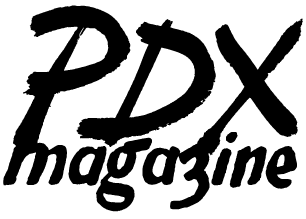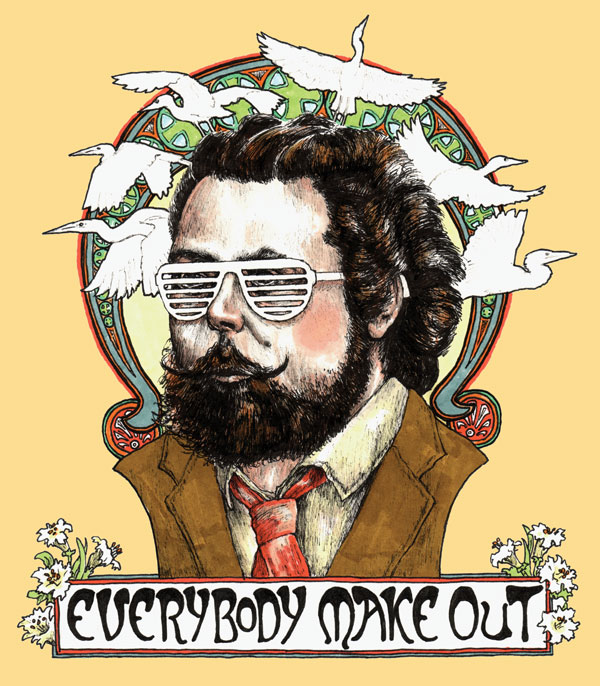By Christopher Corbell
Illustration “Immodest Mussorgsky” by Ezra Butt
When I was 13, neglected, and stoned, music began to take over my life. Though I’d been fascinated with classical music from an early age I had no support to learn it, and it was already much too late for me to be a prodigy by Suzuki-school-kindergarten or even junior-high-marching-band standards. Not yet aware of that shortcoming, in my own meandering escapism from dysfunctional-family chaos I’d taken to guitar and gone beyond the Beatles’ songbook and easy Jimmy Reed blues licks, giving myself to the dark journey: Black Sabbath’s Paranoid on scratchy vinyl. Hazy hour after hour I’d wrestle to master by ear the next phrase of Tony Iommi’s solo in “Iron Man,” worked out on my $50 Univox electric guitar. I didn’t have a proper amp, so I’d plug into an old tape deck and max out the recording level gain to get a really awful sounding distortion through the stereo. Those were the last of my stoner days; I was to get my shit together and clean up at 14. The music love would continue, on to Zeppelin, Rush, and Zappa with some punk and darkwave detours, meanwhile also teaching myself to read and play Sor, Tarrega, and Bach.
I’ve always been grateful for music as a redemptive force. Sharing with an audience and feeling that exchange of energy never gets old. I think all those hours with Sabbath had a spiritual effect. As the Lord of Darkness famously said, “I have a genuine love affair with my audience. When I’m on stage they’re not privileged to see me. It’s a privilege for me to see them.” Sometimes I feel the classical music world could learn something from Ozzy.
Zen and the art of listening
I’m not sure whether zen meditation taught me to fully experience classical music or if listening to classical music prepared me for zazen. A central paradox of zen involves being in a sacred space that is also actual, ordinary. Last spring Cantores in Ecclesia presented works of Tallis, Lassus, Palestrina, Purcell and others. I sat very still and let the early polyphony unfold. At first there were things tugging at me, details to take in, interests to act upon — the little surprises in the modal harmonies, slight imperfections in performance (there always are), the mystic poetry of the texts, my lovely friend sitting next to me, observations on the tone of various singers and whether I might be able to hire any of them for future art-song projects. After 20 minutes all of that had fallen away. As in zen where the goal is to let go of intentions and analysis and think non-thought, I was left simply floating in a field of unfolding beauty. History was annihilated by voices, by these clear, haunting, becoming and dying sounds.
On the first Sunday of each month at the Waypost I listen to a mish-mash of chamber music old and new, instrumental and vocal, sometimes even electronic. The performances are supplemented by audience chatter and often accompanied by the bartender’s blender grinding up a frozen drink. For the regular crowd the noise does not diminish appreciation for the music; it just puts it in a more social and casual context. This monthly chamber jam serves as testing ground for material and as a networking opportunity for collaborations that lead to alt-classical concerts at bigger venues like the Star Theater or Vie de Boheme. It’s a fun and burgeoning cultural space to inhabit, no less valuable to me than formal concerts where the serene takes over.
And yet I’m troubled by some of the older classical paradigms, not for their own sake — I love the reverent and even the grandiose trappings of the genre — but because I still encounter those who feel there’s only one right way to approach this musical domain. We get occasional guests at the Waypost who leave in a huff when they discover that talking is permitted during a Brahms quintet. A colleague told me recently that he felt it was essential that we bring classical music to those who didn’t normally “get to hear it,” and I sensed superiority in his outlook, like a missionary bringing the gospel to the pop-culture heathen. A conservatory-trained violinist complained to me about lowering standards because I advocate total inclusiveness in the classical music underground where I’m active.
These attitudes combine into a caricature that most classical musicians don’t embody but which is still not without basis: a snob’s world, requiring performers to be venerated and audiences to be hushed and restrained…a world that patronizes the general public with an air of enlightened superiority…a world that bars entry by employing demonstrative pedantry and exhaustive credentials.
It’s like the notion of the “missionary position,” a term coined by Alfred Kinsey which suggests that other approaches to sex were proscribed by missionaries. While some people might genuinely prefer that their love affair with music always take place in one particular way, I sense that most people, even in our classical music community, enjoy a little variety when they cavort with suites, sonatas, and fugues.
Revelation
I love syncretism too much to be a very strict zen student. I explore other forms of meditation, including Western mysticism and non-zen Buddhist traditions. A favorite book, A Practical Guide to Buddhist Meditation, puts forward two flavors of meditation, both more content-centered than zazen: Metta meditation cultivates universal compassion and insight meditation seeks revelation to transcend some dilemma.
I sit half-lotus and seek the way to work past the classical missionary-position caricature. I falter, thinking: Why not just stick with punk and say, Fuck all the haughty and refined bullshit. But I don’t want to be a caricature punk any more than I want to be a caricature classicist; I still have love for the music, and the music itself encompasses passion as well as compassion, revolution as well as reverence. I also am searching for a way forward, for my own not-quite-credentialed music and for that of others. A fairly large majority of the 7 billion people on the planet right now have come from situations much more disadvantaged than my chaotic lower-middle-class American start in life. The pyramid of the traditional conservatory culture is too steep for the likes of us, with our cheap instruments and our late starts. I sense the most vital way the classical music paradigm is shifting is not for the sake of those on the inside, but for the sake of those on the outside. As a former outsider (with perhaps still only one foot in the door), I’ve got a role to play.
And so in my meditative seeking I return to that 13-year-old impulse to mastery of “Iron Man,” all of its dimensions — my early teen libido, my nascent, determined discipline battling the insecure questioning of my own talent, feeling disempowered, seeking cathartic refuge from family dysfunction. Ozzy appears from the swirling black vinyl with his message of love, and as he raises his arms a wind begins to blow his black cape.
The music changes; it’s undulating and chromatic, waves of rising and falling strings, and I’m suddenly surfing the overture to Mozart’s Don Giovanni. Ozzy’s cape billows with a flourish just as the overture modulates to a major key, and from behind it appears Wolfgang himself, sexy and beaming in a gold-lamé smoking jacket with frilly white ascot and tight studded liederhosen. Inscribed in Terry-Gilliam-style angelic clouds above him are his own words:
Neither a lofty degree of intelligence nor imagination nor both together go to the making of genius. Love, love, love, that is the soul of genius.
The insight emerges as Mozart reveals in a series of handy illustrative mystic visions his ancient Masonic/Tantric secret, the way past the missionary position caricature: the Classical Music Kama Sutra.
Flowering Hoi Paloi
Take your instrument to a crowded public area such as a downtown park or street corner. Play and observe, as you do, each person who crosses the field of your music; feel gratitude for them, howsoever they engage with you. Your gratitude creates a flow of loving energy that feeds your music. Bloom; unfold.
Intergalactic Blind Date
Meet with a non-classical musician to play music. Do not work out too much beforehand; have a flirtatious musical conversation. Approach the other as an advanced sentient being from another galaxy, with a different language and pleasure capability no less complex or nuanced than your own. Make out.
Sublime Harsh Reptile
On a weekend night attend a multi-band performance at a noisy punk club like the Know, Kenton Club, or East End. (Ear plugs are totally okay!) Drink cheap tallboys and with secret joy assimilate with the crowd, the band, the bartenders. Be cool.
Orgy of Emptiness
Sit for awhile at a bus stop, sports bar, or mall food court. Listen to every sound which emerges and disappears: rhythms, timbres, patterns and transitions. Find evidence of the complexity of the actual which surpasses Bach, Stravinsky, Xenakis. Breathe noise.
The Mad Maestro
Arrange for a solo or chamber performance in a casual environment, such as a CRPDX chamber jam or a soirée in the home. Play everything slanted, bizarre, off-kilter: Junkyard Band Beethoven, Thelonious Mendelssohn, Tom Waits Telemann. Keep chamber music weird.
Mind Domination Safe Word
Bring a pocket notebook and a neophyte friend to a performance of a work you’re an expert on, and hit the nearest bar afterwards. Feel the urge to wax pedantic and dissect analytically every aspect of the performance: formal elements, historical anecdotes, performance critiques. Before saying anything, excuse yourself to the restroom and write all you were going to say down. Put the notebook in your pocket, return to your friend, buy her a drink, and ask them to talk. Love listening.
Bodhisattva High Bar
Listen to a recorded performance by the most consummate classical performer you know. Note flaws. If you can’t find them, use your imagination, raise the bar to an impossible level. You’ll hear flaws everywhere. Forgive them and enjoy the humanity of the performer’s attempt. Now listen to a classical beginner, where the flaws are easy to note, and recognize how perfect each is, as a free event of beautiful intention in space-time. Save everyone.
Mozart had to hurry off to an astral tryst but assured me that I could work out the other positions on my own, with a little imagination and a few thousand lifetimes.
—
Christopher Corbell is a composer, multi-instrumentalist, Executive Director of Classical Revolution PDX, and founder of Muse:forward, a Portland emerging-music think-tank.


Christa Wessel
This is me, giving you a hootin’, hollerin’ standing ovation, Christopher. Well friggin’ said!
News & Notes talks business, George Colligan, classical zen | Oregon ArtsWatch
[…] musician/zazen sitter/music admin guy (Classical Revolution PDX) Christopher Corbell’s Classical Music Kama Sutra in PDX Magazine. Here’s the first of his suggestions for his classical music-loving […]